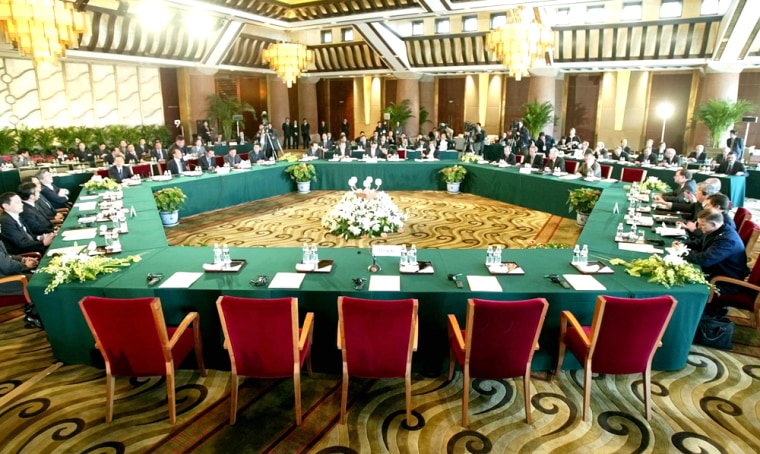Six-nation talks on ending North Korea’s alleged nuclear weapons program made more progress than expected, a top U.S. delegate said Saturday as the meeting ended. Pyongyang said it would never give up its peaceful nuclear program.
The meeting ended with agreement to hold more negotiations before July and form a lower-level “working group” to handle details of the 16-month-old dispute. Both are steps toward establishing an enduring line of communication between the United States and the North, which have no diplomatic relations.
The communist North, however, gave no ground on U.S. demands that it completely give up its nuclear ambitions and insisted on keeping technology and equipment used to generate electricity, among other “peaceful purposes.”
“We don’t plan to include our civilian nuclear program, for peaceful purposes, in the freeze and dismantlement,” said the North’s chief delegate, Vice Foreign Minister Kim Kye Gwan.
Washington claims North Korea has admitted producing a nuclear bomb, an allegation the North denies.
A senior U.S. official said he was upbeat after four days of talks and sometimes confusing signals but said the U.S. goal of a nuclear-free North Korea had not changed.
But the U.S. official, who spoke to The Associated Press on condition of anonymity, said: “I’m not aware of any peaceful nuclear programs in the DPRK, so this is an issue that will have to be dealt with over time.”
Participants said they expected a long process ahead over key contentious issues, including how deeply the North would be willing to cut its nuclear development. So far it is offering only to freeze and dismantle what it terms its “nuclear weapons program.”
The second round of talks, held six months after meetings in August made no progress, brought together the Koreas, the United States, Russia, China and Japan to hash out whether the Korean Peninsula can be made free of nuclear weapons.
All parties — including the North — say they want that, but their definitions of “nuclear-free” have varied.
‘Differences’ remain
Despite the upbeat U.S. assessment, the four days of negotiations, more intense and lengthier than the last round, ended on a discordant note.
On Saturday, after the closing ceremony was delayed for three hours, the governments failed to issue their planned joint statement because of North Korea’s last-minute request to change the wording. It wanted to refer to “differences” among participants, diplomats said.
Even after the ceremony was scheduled, every delegation but North Korea’s sat waiting for several tense minutes — broadcast live on Chinese television — as the sixth side of the table remained empty. Finally, Kim and his entourage strode in and took their seats.
Hours later, the revised document emerged as an unsigned “chairman’s statement” that emphasized progress and cooperation, but the deep divides that fuel the dispute were clear.
“The main reason for these differences is the extreme lack of trust,” said China’s delegation chief, Vice Foreign Minister Wang Yi.
Kim said in a rare news conference at his country’s embassy that the talks saw no “positive result,” a complaint for which he blamed the United States.
“The big achievement of the talks is that we clearly learned there are great differences between participating countries, especially between North Korea and the United States,” Kim said.
He said his delegation offered to freeze its nuclear-weapons activities and dismantle the program if the United States drops its “hostile policy.” North Korea has been demanding security guarantees, free oil and other aid from the United States in exchange for action.
During the talks, South Korea, China and Russia offered the North crucial energy aid if it agreed to disarm. Washington said it “understands” the offer but declined to sign on; it has repeatedly ruled out any concession before Pyongyang “completely, verifiably and irreversibly dismantles” all nuclear programs.
The United States affirmed Saturday that it had “no hostile intent” against the North, Wang said — a major concern of Pyongyang’s, particularly since President Bush included the North in an “axis of evil” in 2002.
The United States “has no intention to invade or attack North Korea,” Wang said. “It has no intention to seek regime change.”
U.S., N. Korea still at odds
The delegates had met since Wednesday in the Chinese capital for the second round of six-party talks, a gathering that took months to put together. The last set, in August, produced some discord but no substantive result.
North Korea and the United States have been at odds over Pyongyang’s nuclear ambitions for years and specially since October 2002, when U.S. Assistant Secretary of State James Kelly said the North told him it had a secret program based on enriched uranium — thus, Washington said, violating a 1994 agreement. Kelly led the U.S. delegation to the Beijing talks.
Another sticking point is American allegations that the North has a uranium program besides its known plutonium-based program, a charge the North has loudly denied. But it brandishes the threat of what it describes as its “nuclear deterrent” to extract concessions.
U.S. officials believe North Korea already has one or two nuclear bombs and could make several more within months.
